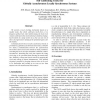Free Online Productivity Tools
i2Speak
i2Symbol
i2OCR
iTex2Img
iWeb2Print
iWeb2Shot
i2Type
iPdf2Split
iPdf2Merge
i2Bopomofo
i2Arabic
i2Style
i2Image
i2PDF
iLatex2Rtf
Sci2ools
ICCD
2000
IEEE
2000
IEEE
Self-Calibrating Clocks for Globally Asynchronous Locally Synchronous Systems
We present a local clocking mechanism based on a tunable delay line which calibrates itself from a low frequency global clock. After initial tuning, the local clock remains calibrated when environmental conditions change. Each module of a large system on a chip can use one of these clock generators running at the optimal frequency for the module. Communication between locally synchronous blocks is provided by a globally asynchronous interconnect. Reliable low latency communication between the asynchronous interconnect and a local clock domain is made possible by stretching the local clock if a metastable condition could be encountered. Stretching the clock just requires the rising clock edge to be prevented from entering the tuned delay line. Similarly, a sleep state can be entered by stopping the clock and wakeup is almost instantaneous. Fine grained sleeping is possible by sleeping whenever there is no work to be undertaken and waking up as soon as new data appears over the asynchro...
Related Content
| Added | 16 Mar 2010 |
| Updated | 16 Mar 2010 |
| Type | Conference |
| Year | 2000 |
| Where | ICCD |
| Authors | Simon W. Moore, George S. Taylor, Paul A. Cunningham, Robert D. Mullins, Peter Robinson |
Comments (0)

